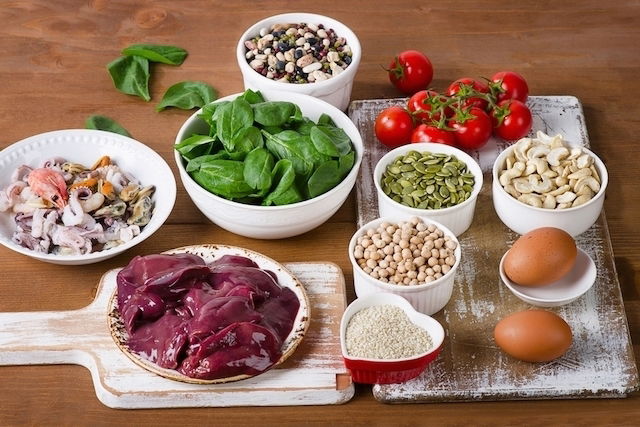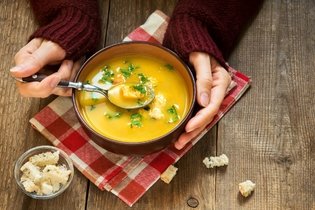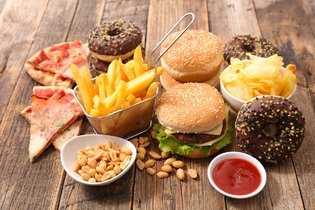A gastritis diet is typically based on natural foods like fruits, vegetables and whole grain foods. You should reduce or avoid intake of highly processed products like sausages, fried foods and soft drinks.
A more natural diet facilitates the digestive process and allows food to pass quickly through the stomach. This prevents excess production of stomach acid from being released, which causes heartburn, pain and worsening of any ulcers you may have.
You should consult a registered dietitian before starting a gastritis diet, as a dietitian is able to provide a thorough assessment and develop a meal plan that is best suited for your current health status.

3-day meal plan
The table below is an example of a 3-day diet to treat gastritis and stomach ulcers:
Recommended foods
When treating gastritis, the food you eat should be easy to digest and low in fat. Some examples include:
- Fruit, although if you have symptoms like acid reflux or pain, you should specifically avoid acidic fruit such as lemons, oranges and pineapple;
- Vegetables, specifically cooked vegetables as these are more easily digested;
- Lean meats, with low fat content, like chicken and fish (preferably roasted, grilled or boiled);
- Skim milk;
- Plain yogurt;
- Whole grains, such as brown bread, brown rice and whole grain pasta;
- Teas except green, yerba mate and black tea, or any that contain caffeine;
- Decaf coffee;
- White cheeses such as ricotta or cottage cheeses
- Natural seasoning such as fine herbs, garlic, onion, parsley, coriander and mustard.
Drinking ginger tea also helps digestion, decreases heartburn and nausea.
Foods to avoid
There are foods that are more difficult to digest and are highly processed. These should be avoided as they are rich in additives and preservatives that may further irritate the stomach. Some examples include:
- Processed meats: sausage, bacon, ham, turkey breast, salami and mortadella;
- Cheese: Yellow and processed cheeses such as cheddar, and provolone;
- Ready-made sauces;
- Seasoning in cubes, meat broths and instant pasta;
- Frozen, ready-made food and fast food;
- Beverages: soft drinks, ready-made juices, coffee, green tea, yerba mate tea or black tea;
- Alcoholic beverages;
- Sugar and sweets in general;
- Refined foods and fried foods, such as cakes, white bread and biscuits;
- White flours, such as seasoned cassava flour, corn flour and, in some cases, couscous;
- Foods high in fat such as fatty meats, chicken skin, liver and excessively oily fish such as salmon and tuna.
In addition, whole milk and acidic fruit (e.g. lemons, oranges and pineapple) should also be avoided, especially if symptoms of heartburn or stomach pain occur after eating them. High-fiber foods should also be consumed in moderation, as these can be harder to digest.
A gastritis diet should be loosely based on the above recommendations, but it can vary depending on the tolerance of each patient. The list suggested above is just a guide. If symptoms of gastritis emerge mainly in times of stress or tension, it may be a sign of stress-induced gastritis.
Gastritis-friendly recipes
1. Baked fruit
A good option for your morning or afternoon snack is to eat baked or boiled fruit.
Preparation: Place 6 apples or 6 pears on a baking tray, side by side and add 3/4 cups of water to the bottom of the tray. Bake in the oven for about 30 minutes or until the fruit is tender. You can add 1 stick of cinnamon in the center of the apple or the pear for taste.
2. Fruit jelly
Natural fruit jelly is a good dessert option for the main meals.
Preparation: Add 1 package of unflavored gelatin to a 200 ml glass of pure grape juice and place in the refrigerator for about 2 hours.
3. Fish broth
Fish broth is an excellent choice for a light dinner, and should be consumed at a warm temperature (ie. not too hot).
Ingredients
- 500 g of fish fillets, diced in cubes;
- Juice from 1 lemon;
- Salt to taste;
- 1 medium onion, chopped;
- 3 cloves of minced garlic;
- 1 tablespoon of olive oil;
- 1 chopped tomato;
- 1/2 chopped pepper;
- 2 medium potatoes;
- Chopped parsley to taste;
- 1 teaspoon of paprika.
Preparation
Season the fish with lemon and salt to taste and let it marinate for 15 minutes. In a saucepan, stir-fry the onion and garlic in the olive oil until soft. Then add the water, potatoes, pepper, tomatoes and bring to a boil. Add the fish to the mixture and leave to cook for a few more minutes. Finally add the chopped parsley, turn off the heat and set aside.
Check-out other home remedies for gastritis that you can add to your prescribed medical treatment.








